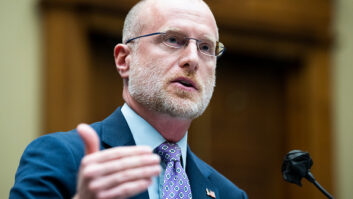
Much of the federal government may still be operating under a partial shutdown, but the Federal Communications Commission is one step closer to normalcy after the U.S. Senate confirmed Democrat Geoffrey Starks as an FCC commissioner and renewed Republican Commissioner Brendan Carr for a full term in a Wednesday voice vote.
The commission will now have its full five-member complement. Until yesterday, the voting members had consisted of Chairman Ajit Pai (Republican), Commissioner Michael O’Rielly (Republican), Commissioner Jessica Rosenworcel (Democrat) and Carr.
[Quadrennial Review Kicks Off More Deregulation Debates]
Both have been in limbo for several months, as highlighted by Carr on Twitter.
Not sure what took you so long, but I could not be happier to congratulate and welcome Geoffrey Starks as a colleague and Commissioner of the FCC. https://t.co/cl4893WU6m
— Brendan Carr (@BrendanCarrFCC) January 3, 2019
Thank you, Mr. Chairman! And congratulations to Geoffrey Starks on your confirmation.
I am honored to serve another term, & I am particularly pleased that Starks – a talented public servant – will join my colleagues & I as we work to bring more broadband to more Americans. https://t.co/JaxdFC1HBt
— Brendan Carr (@BrendanCarrFCC) January 3, 2019
[Read: Saying Goodbye to Mignon]

Starks was approved by the Senate Commerce Committee in June to replace Mignon Clyburn, who stepped down from the commission late last spring. Carr, on the other hand, had been waiting for his full confirmation since early 2018.
“I congratulate Geoffrey on his Senate confirmation. He brings a wealth of experience and expertise, including having served most recently as assistant chief in the Enforcement Bureau,” Pai said in a statement released this week. Pai also took the opportunity to highlight their mutual Midwestern roots: “I look forward to working with him and having a fellow Kansan on the commission.”
Pai also commented on Carr’s confirmation, “Brendan has done tremendous work on a number of issues, including his leadership on wireless infrastructure modernization. He has also been a staunch advocate for rural broadband deployment, particularly for precision agriculture and advancements in telemedicine.”
NAB President and CEO Gordon Smith stated in a release, “These are two dedicated public servants with a firm grasp on telecommunications policy that will serve the American people well.”







